人教七年级下Unit 4 Unit 4 Don't eat in class. Section A(Grammar Focus~3c)课件(共24张PPT)
文档属性
| 名称 | 人教七年级下Unit 4 Unit 4 Don't eat in class. Section A(Grammar Focus~3c)课件(共24张PPT) |
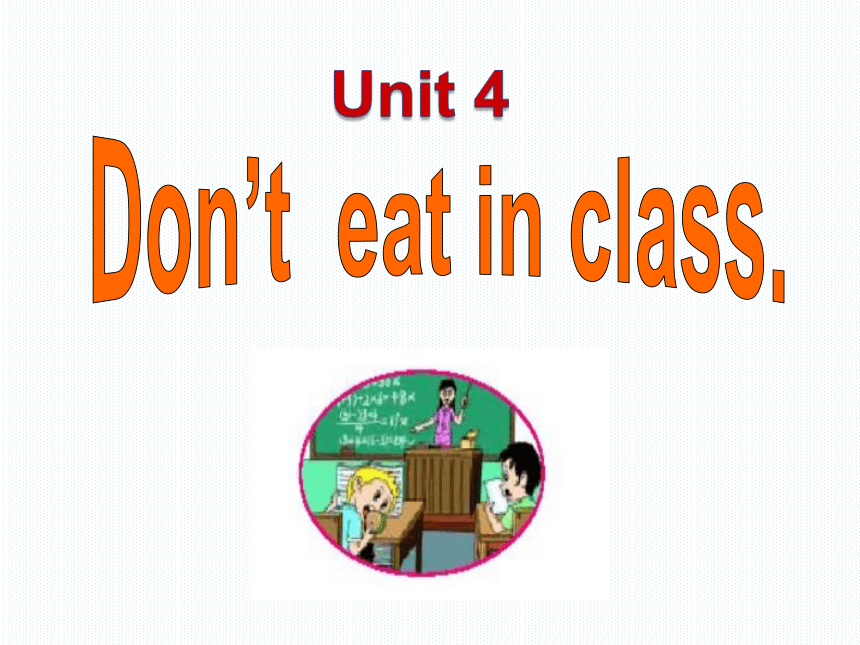
|
|
| 格式 | zip | ||
| 文件大小 | 283.6KB | ||
| 资源类型 | 教案 | ||
| 版本资源 | 人教新目标(Go for it)版 | ||
| 科目 | 英语 | ||
| 更新时间 | 2021-04-01 00:00:00 | ||
图片预览

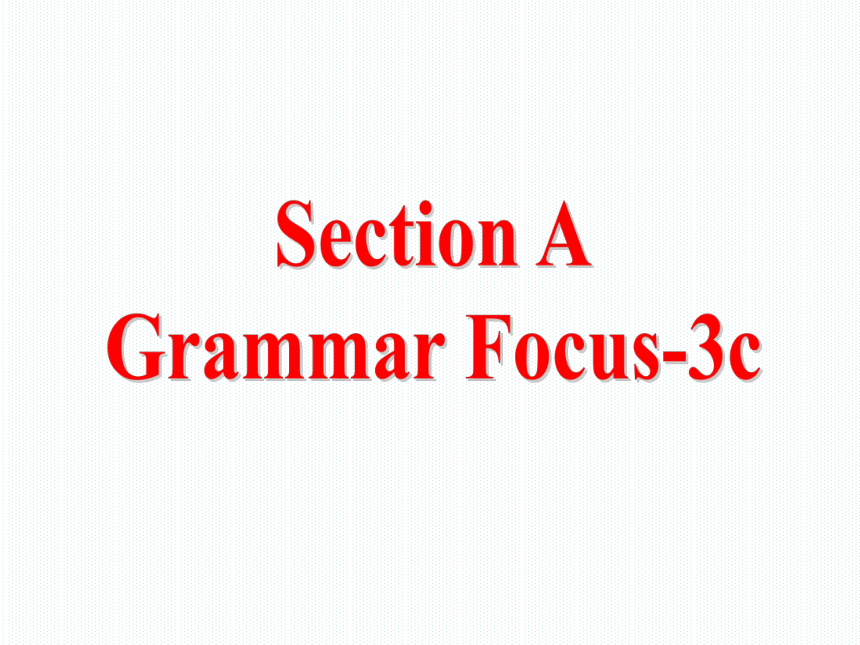
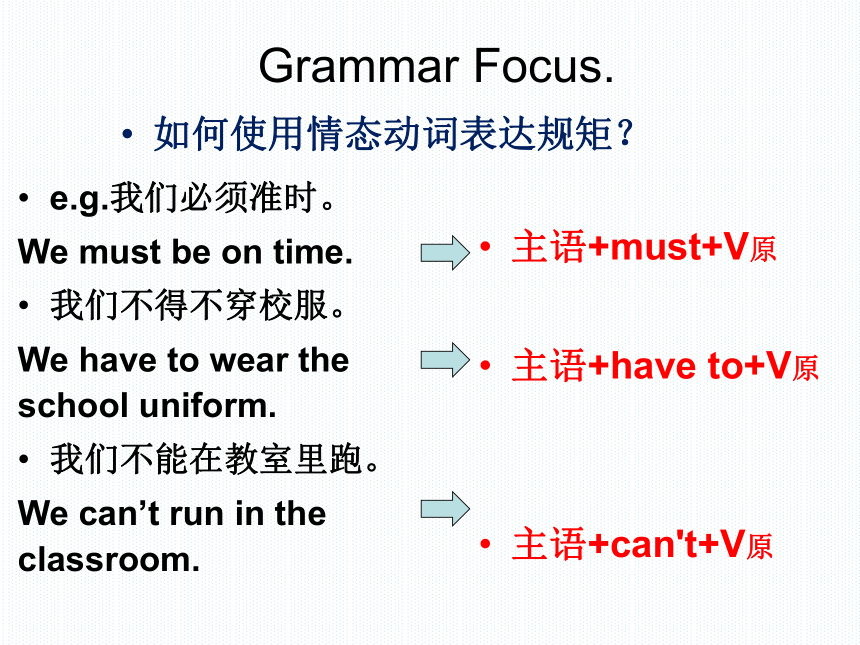
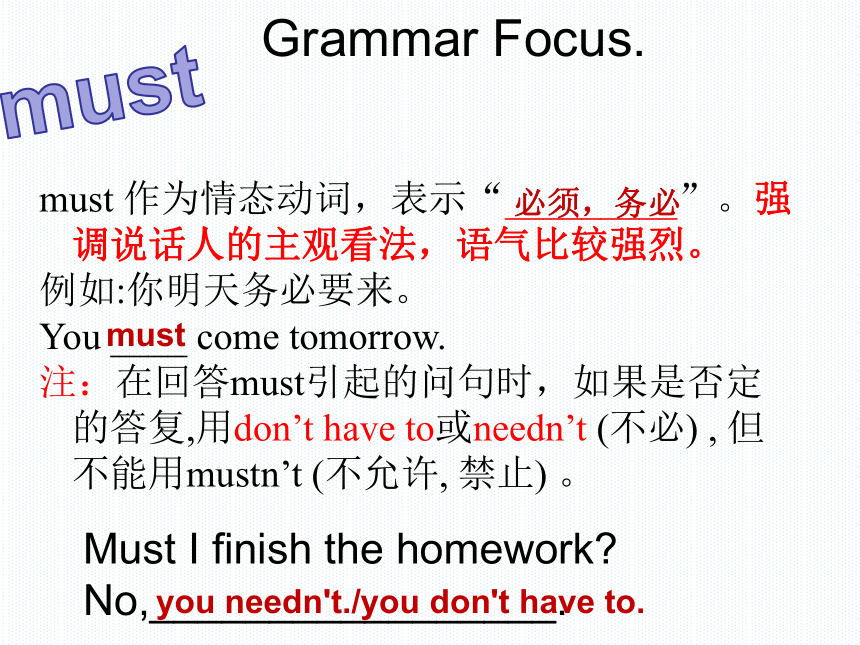
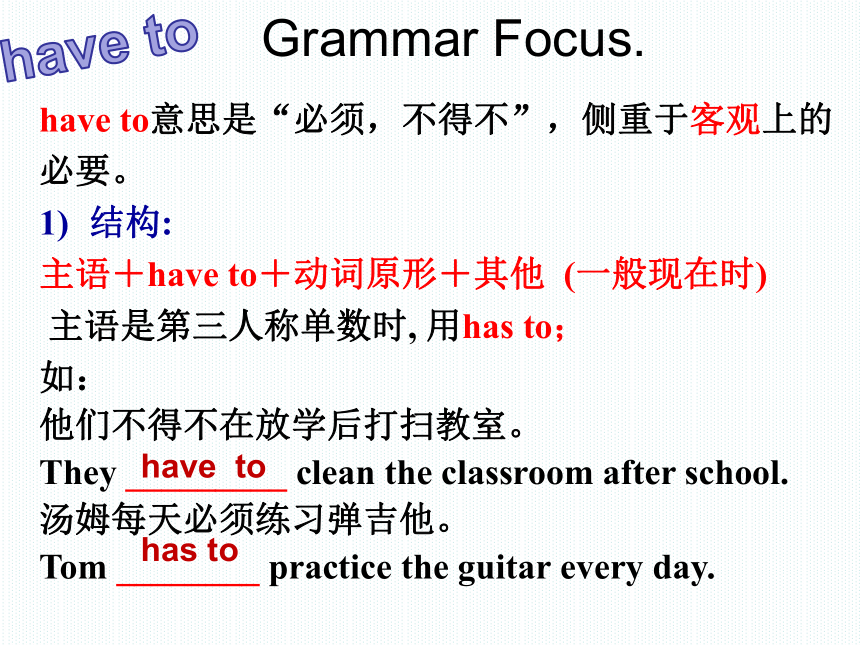
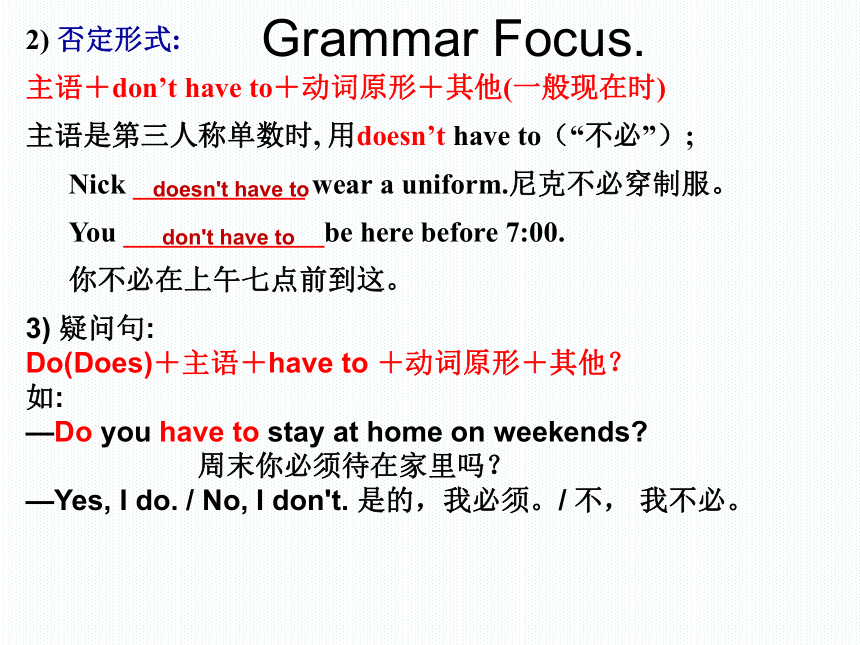
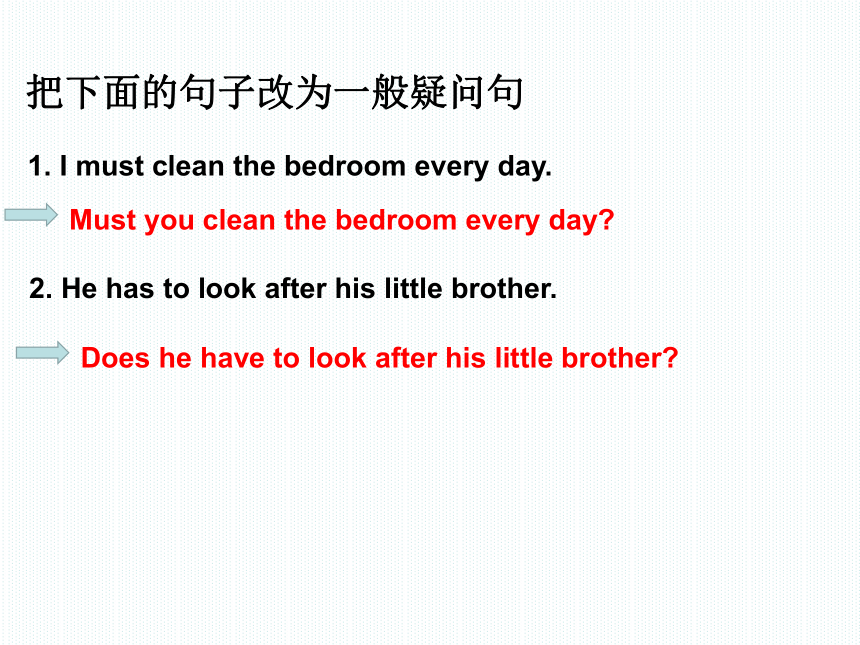

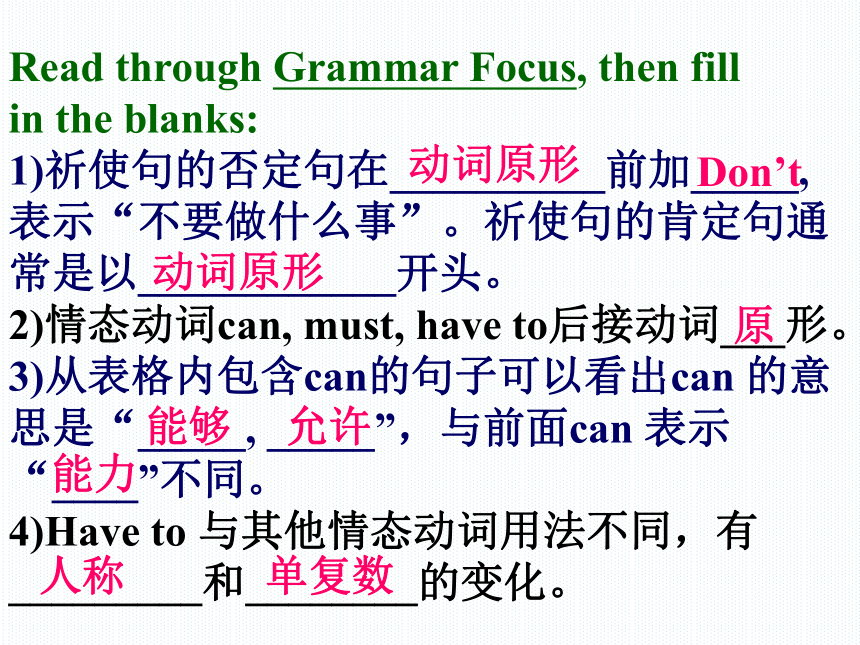
文档简介
(共24张PPT)
Don’t
eat
in
class.
Unit
4
Section
A
Grammar
Focus-3c
e.g.我们必须准时。
We
must
be
on
time.
我们不得不穿校服。
We
have
to
wear
the
school
uniform.
我们不能在教室里跑。
We
can’t
run
in
the
classroom.
主语+must+V原
主语+have
to+V原
主语+can't+V原
如何使用情态动词表达规矩?
Grammar
Focus.
must
作为情态动词,表示“_________”。强调说话人的主观看法,语气比较强烈。
例如:你明天务必要来。
You
____
come
tomorrow.
注:在回答must引起的问句时,如果是否定的答复,用don’t
have
to或needn’t
(不必)
,
但不能用mustn’t
(不允许,
禁止)
。
must
Grammar
Focus.
必须,务必
must
Must
I
finish
the
homework?
No,_________________.
you
needn't./you
don't
have
to.
have
to意思是“必须,不得不”,侧重于客观上的
必要。
结构:
主语+have?to+动词原形+其他
(一般现在时)
主语是第三人称单数时,
用has?to;
如:
他们不得不在放学后打扫教室。
They
_________
clean
the
classroom
after
school.
汤姆每天必须练习弹吉他。
Tom?________?practice?the?guitar?every?day.?
have
to
Grammar
Focus.
have
to
has
to
2)
否定形式:
主语+don’t?have?to+动词原形+其他(一般现在时)
主语是第三人称单数时,
用doesn’t?have?to(“不必”);
Nick?____________?wear?a?uniform.尼克不必穿制服。
You?______________be
here
before
7:00.?
你不必在上午七点前到这。
3)
疑问句:
Do(Does)+主语+have?to?+动词原形+其他?
如:
—Do?you?have?to?stay?at?home?on?weekends??
周末你必须待在家里吗?
—Yes,?I?do.?/?No,?I?don't.?是的,我必须。/
不,
我不必。
Grammar
Focus.
doesn't
have
to
don't
have
to
把下面的句子改为一般疑问句
1.
I
must
clean
the
bedroom
every
day.
Must
you
clean
the
bedroom
every
day?
2.
He
has
to
look
after
his
little
brother.
Does
he
have
to
look
after
his
little
brother?
练一练:用have
to,
must
填空
1.
It’s
cold
outside.
We
______
stay
at
home.
2.
We
____
be
good
with
our
parents.
3.I
_____
study
hard(努力学习).
4.Mother
is
out,
so
I
______
look
after
my
little
sister.
have
to
must
must
have
to
Read
through
Grammar
Focus,
then
fill
in
the
blanks:
1)祈使句的否定句在__________前加_____,
表示“不要做什么事”。祈使句的肯定句通常是以____________开头。
2)情态动词can,
must,
have
to后接动词___形。
3)从表格内包含can的句子可以看出can
的意思是“_____,
_____”,与前面can
表示“____”不同。
4)Have
to
与其他情态动词用法不同,有_________和________的变化。
动词原形
Don’t
动词原形
原
能够
允许
能力
人称
单复数
读以下句子并将其分类,给出分类的理由。
1.Open
the
door,
please.
2.Be
a
good
boy!
3.Come
and
buy
our
clothes.
4.Let
him
try.
5.No
smoking!
6.Let’s
walk
to
school.
7.No
photos.
8.Let
me
tell
you
my
school
life.
9.Be
quiet
in
the
library.
答案:1,
3,
2,9
4,6,8
5,7
1.Open
the
door,
please.
3.Come
and
buy
our
clothes.
2.Be
a
good
boy!
9.Be
quiet
in
the
library.
4.Let
him
try.
6.Let’s
walk
to
school.
8.Let
me
tell
you
my
school
life.
5.No
smoking!
7.No
photos.
Do
型
Be型
Let型
No型
1.
肯定祈使句的常见句型结构:
(1)
Do型:动词原形+宾语+其他.
如:
Open
the
door,
please.
(2)Be型:Be+表语.
如:Be
a
good
boy!
(3)
Let型:Let+宾语+动词原形+其他.
(或:Let’s+动词原形+其他.)
如:
Let
me
help
you.
又如:Let’s
play
tennis.
2.
否定祈使句的常见句型结构:
①
Do型和Be型的否定式:Don’t+动词
原形
/
be+其他.
如:Don’t
forget
me.
又如:Don’t
be
late.
②
Let型的否定式:Don’t+let+宾语+动词原形+其他.
(或:Let’s+not+动词原形+其他.)
如:Don’t
let
him
go
back.
又如:Let’s
not
go
swimming.
③
警示语:No+名词
/
动词-ing形式.
如:
No
talking.
练习一:将下面的句子改为祈使句
1.
You
can
come
in.
______
____,
please.
2.
I
can
help
you.
_____
me
______
you.
3.
You
can’t
eat
in
class.
_______
_____
in
class.
4.
You
can’t
be
late
for
school.
______
____
late
for
school.
5.
You
can’t
take
photos(拍照)
here.
____
photos
here.
Come
in
Let
help
Don’t
eat
Don’t
be
No
练习二:将以下祈使句改成否定祈使句。
Examples:
肯定祈使句
否定祈使句
Sit
down.
Come
in.
Let's
play
basketball.
Be
a
good
boy.
5.
Do
your
homework
at
school.
Don’t
sit
down.
Don’t
come
in
.
Don’t
do
your
homework
at
school.
Let's
not
play
basketball.
Don't
let
us
play
basketball.
Don’t
be
a
good
boy.
Library
rules
1.
Don’t
talk.
2.
__________
3.
__________
________
4.
__________
_______
Don’t
eat.
Write
the
rules
for
the
school
library.
3a
Don’t
listen
to
music.
Don’t
take
photos.
方法指导:
1.
由图示可知都是一些禁止类的祈使句。
2.
可知应用“Don’t
+
动词原形”句子。
Use
the
words
to
make
questions
about
the
rules.
Then
write
answers
according
to
your
school.
3b
1.
Be
quiet?
Q:
Does
she
have
to
be
quiet
in
the
library?
(she/have
to/in
the
library)
A:
Yes,
she
does.
2.
Eat?
Q:
________________________________
(he/
have
to/
in
the
dining
hall)?
A:
_________________________________
Does
he
have
to
eat
in
the
dining
hall?
No,
he
doesn’t.
He
can
also
eat
outside.
1.
根据例句,可知要求我们造一般疑问句并根据实际情况进行回答。
2.
先确定句子的主语。
3.
再确定用情态动词还是用助动词来构成疑问语序。
4.
根据实际情况做出肯定或否定回答,答语的主语要与问句保持一致。
3.
Listen
to
music?
Q:
________________________________
(we/
can/
in
the
hallways)?
A:
________________
4.
Wear
a
hat?
Q:
_______________________________
(we/
can/
in
the
classroom)?
A:
_______________
Can
we
listen
to
music
in
the
hallways?
Can
we
wear
a
hat
in
the
classroom?
No,
we
can’t.
No,
we
can’t.
Make
up
five
cool
rules
for
your
dream
school.
Share
your
rules
with
the
class.
Your
classmates
vote
for
the
Coolest
School!
3c
1.
We
can
eat
in
class.
2.
We
don’t
have
to
come
to
school
every
day.
3.
…
IV.
Quiz:句型转换:
(每空10分)
You
can’t
take
photos
in
the
museum.
(改为祈使句)
______________
______________
photos
in
the
museum.
2.
She
has
to
play
sports
every
morning.
(改为一般疑问)
__________she
_________
to
play
sports
every
morning?
3.
At
home
we
must
finish
our
homework.
(改为同义句)
At
home
we
___________
________finish
our
homework.
4.
Do
your
homework
at
home.
(改为否定句)
_______________
____________your
homework
at
home.
5.
Don’t
eat
in
the
classroom.
(改为同义句)
____________
______________________in
the
classroom.
Don’t
take
Does
have
have
to
Don’t
do
No
eating
Quiz
用所给单词的适当形式填空:
1.
_______
_________(not
listen)
to
music
in
the
library.
2.
Do
we
have
to
________(clean)
the
room
every
day?
3.
You
can’t
________(wear)
sunglasses
in
the
classroom.
4.
Please
________(arrive)
at
school
on
time
(准时).
5.
John
____
(be)
never
late
for
class.
is
listen
clean
wear
arrive
Don’t
6.
Does
he
______(have)
to
be
on
time?
7.
We
have
to
____(be)
quiet
in
the
library.
8.
You
must
______(eat)
in
the
dining
room.
9.
What
do
you
have
to
____(do)?
10.
She
__________(not)
have
to
wear
a
uniform.
have
be
eat
do
doesn’t
Homework:
Do
you
have
some
rules
in
you
family
?
Please
write
down
your
family
rules.
GoodBye!
Don’t
eat
in
class.
Unit
4
Section
A
Grammar
Focus-3c
e.g.我们必须准时。
We
must
be
on
time.
我们不得不穿校服。
We
have
to
wear
the
school
uniform.
我们不能在教室里跑。
We
can’t
run
in
the
classroom.
主语+must+V原
主语+have
to+V原
主语+can't+V原
如何使用情态动词表达规矩?
Grammar
Focus.
must
作为情态动词,表示“_________”。强调说话人的主观看法,语气比较强烈。
例如:你明天务必要来。
You
____
come
tomorrow.
注:在回答must引起的问句时,如果是否定的答复,用don’t
have
to或needn’t
(不必)
,
但不能用mustn’t
(不允许,
禁止)
。
must
Grammar
Focus.
必须,务必
must
Must
I
finish
the
homework?
No,_________________.
you
needn't./you
don't
have
to.
have
to意思是“必须,不得不”,侧重于客观上的
必要。
结构:
主语+have?to+动词原形+其他
(一般现在时)
主语是第三人称单数时,
用has?to;
如:
他们不得不在放学后打扫教室。
They
_________
clean
the
classroom
after
school.
汤姆每天必须练习弹吉他。
Tom?________?practice?the?guitar?every?day.?
have
to
Grammar
Focus.
have
to
has
to
2)
否定形式:
主语+don’t?have?to+动词原形+其他(一般现在时)
主语是第三人称单数时,
用doesn’t?have?to(“不必”);
Nick?____________?wear?a?uniform.尼克不必穿制服。
You?______________be
here
before
7:00.?
你不必在上午七点前到这。
3)
疑问句:
Do(Does)+主语+have?to?+动词原形+其他?
如:
—Do?you?have?to?stay?at?home?on?weekends??
周末你必须待在家里吗?
—Yes,?I?do.?/?No,?I?don't.?是的,我必须。/
不,
我不必。
Grammar
Focus.
doesn't
have
to
don't
have
to
把下面的句子改为一般疑问句
1.
I
must
clean
the
bedroom
every
day.
Must
you
clean
the
bedroom
every
day?
2.
He
has
to
look
after
his
little
brother.
Does
he
have
to
look
after
his
little
brother?
练一练:用have
to,
must
填空
1.
It’s
cold
outside.
We
______
stay
at
home.
2.
We
____
be
good
with
our
parents.
3.I
_____
study
hard(努力学习).
4.Mother
is
out,
so
I
______
look
after
my
little
sister.
have
to
must
must
have
to
Read
through
Grammar
Focus,
then
fill
in
the
blanks:
1)祈使句的否定句在__________前加_____,
表示“不要做什么事”。祈使句的肯定句通常是以____________开头。
2)情态动词can,
must,
have
to后接动词___形。
3)从表格内包含can的句子可以看出can
的意思是“_____,
_____”,与前面can
表示“____”不同。
4)Have
to
与其他情态动词用法不同,有_________和________的变化。
动词原形
Don’t
动词原形
原
能够
允许
能力
人称
单复数
读以下句子并将其分类,给出分类的理由。
1.Open
the
door,
please.
2.Be
a
good
boy!
3.Come
and
buy
our
clothes.
4.Let
him
try.
5.No
smoking!
6.Let’s
walk
to
school.
7.No
photos.
8.Let
me
tell
you
my
school
life.
9.Be
quiet
in
the
library.
答案:1,
3,
2,9
4,6,8
5,7
1.Open
the
door,
please.
3.Come
and
buy
our
clothes.
2.Be
a
good
boy!
9.Be
quiet
in
the
library.
4.Let
him
try.
6.Let’s
walk
to
school.
8.Let
me
tell
you
my
school
life.
5.No
smoking!
7.No
photos.
Do
型
Be型
Let型
No型
1.
肯定祈使句的常见句型结构:
(1)
Do型:动词原形+宾语+其他.
如:
Open
the
door,
please.
(2)Be型:Be+表语.
如:Be
a
good
boy!
(3)
Let型:Let+宾语+动词原形+其他.
(或:Let’s+动词原形+其他.)
如:
Let
me
help
you.
又如:Let’s
play
tennis.
2.
否定祈使句的常见句型结构:
①
Do型和Be型的否定式:Don’t+动词
原形
/
be+其他.
如:Don’t
forget
me.
又如:Don’t
be
late.
②
Let型的否定式:Don’t+let+宾语+动词原形+其他.
(或:Let’s+not+动词原形+其他.)
如:Don’t
let
him
go
back.
又如:Let’s
not
go
swimming.
③
警示语:No+名词
/
动词-ing形式.
如:
No
talking.
练习一:将下面的句子改为祈使句
1.
You
can
come
in.
______
____,
please.
2.
I
can
help
you.
_____
me
______
you.
3.
You
can’t
eat
in
class.
_______
_____
in
class.
4.
You
can’t
be
late
for
school.
______
____
late
for
school.
5.
You
can’t
take
photos(拍照)
here.
____
photos
here.
Come
in
Let
help
Don’t
eat
Don’t
be
No
练习二:将以下祈使句改成否定祈使句。
Examples:
肯定祈使句
否定祈使句
Sit
down.
Come
in.
Let's
play
basketball.
Be
a
good
boy.
5.
Do
your
homework
at
school.
Don’t
sit
down.
Don’t
come
in
.
Don’t
do
your
homework
at
school.
Let's
not
play
basketball.
Don't
let
us
play
basketball.
Don’t
be
a
good
boy.
Library
rules
1.
Don’t
talk.
2.
__________
3.
__________
________
4.
__________
_______
Don’t
eat.
Write
the
rules
for
the
school
library.
3a
Don’t
listen
to
music.
Don’t
take
photos.
方法指导:
1.
由图示可知都是一些禁止类的祈使句。
2.
可知应用“Don’t
+
动词原形”句子。
Use
the
words
to
make
questions
about
the
rules.
Then
write
answers
according
to
your
school.
3b
1.
Be
quiet?
Q:
Does
she
have
to
be
quiet
in
the
library?
(she/have
to/in
the
library)
A:
Yes,
she
does.
2.
Eat?
Q:
________________________________
(he/
have
to/
in
the
dining
hall)?
A:
_________________________________
Does
he
have
to
eat
in
the
dining
hall?
No,
he
doesn’t.
He
can
also
eat
outside.
1.
根据例句,可知要求我们造一般疑问句并根据实际情况进行回答。
2.
先确定句子的主语。
3.
再确定用情态动词还是用助动词来构成疑问语序。
4.
根据实际情况做出肯定或否定回答,答语的主语要与问句保持一致。
3.
Listen
to
music?
Q:
________________________________
(we/
can/
in
the
hallways)?
A:
________________
4.
Wear
a
hat?
Q:
_______________________________
(we/
can/
in
the
classroom)?
A:
_______________
Can
we
listen
to
music
in
the
hallways?
Can
we
wear
a
hat
in
the
classroom?
No,
we
can’t.
No,
we
can’t.
Make
up
five
cool
rules
for
your
dream
school.
Share
your
rules
with
the
class.
Your
classmates
vote
for
the
Coolest
School!
3c
1.
We
can
eat
in
class.
2.
We
don’t
have
to
come
to
school
every
day.
3.
…
IV.
Quiz:句型转换:
(每空10分)
You
can’t
take
photos
in
the
museum.
(改为祈使句)
______________
______________
photos
in
the
museum.
2.
She
has
to
play
sports
every
morning.
(改为一般疑问)
__________she
_________
to
play
sports
every
morning?
3.
At
home
we
must
finish
our
homework.
(改为同义句)
At
home
we
___________
________finish
our
homework.
4.
Do
your
homework
at
home.
(改为否定句)
_______________
____________your
homework
at
home.
5.
Don’t
eat
in
the
classroom.
(改为同义句)
____________
______________________in
the
classroom.
Don’t
take
Does
have
have
to
Don’t
do
No
eating
Quiz
用所给单词的适当形式填空:
1.
_______
_________(not
listen)
to
music
in
the
library.
2.
Do
we
have
to
________(clean)
the
room
every
day?
3.
You
can’t
________(wear)
sunglasses
in
the
classroom.
4.
Please
________(arrive)
at
school
on
time
(准时).
5.
John
____
(be)
never
late
for
class.
is
listen
clean
wear
arrive
Don’t
6.
Does
he
______(have)
to
be
on
time?
7.
We
have
to
____(be)
quiet
in
the
library.
8.
You
must
______(eat)
in
the
dining
room.
9.
What
do
you
have
to
____(do)?
10.
She
__________(not)
have
to
wear
a
uniform.
have
be
eat
do
doesn’t
Homework:
Do
you
have
some
rules
in
you
family
?
Please
write
down
your
family
rules.
GoodBye!
同课章节目录
- Unit 1 Can you play the guitar?
- Section A
- Section B
- Unit 2 What time do you go to school?
- Section A
- Section B
- Unit 3 How do you get to school?
- Section A
- Section B
- Unit 4 Don't eat in class.
- Section A
- Section B
- Unit 5 Why do you like pandas?
- Section A
- Section B
- Unit 6 I'm watching TV.
- Section A
- Section B
- Review of Units 1-6
- Unit 7 It's raining!
- Section A
- Section B
- Unit 8 Is there a post office near here?
- Section A
- Section B
- Unit 9 What does he look like?
- Section A
- Section B
- Unit 10 I'd like some noodles.
- Section A
- Section B
- Unit 11 How was your school trip?
- Section A
- Section B
- Unit 12 What did you do last weekend?
- Section A
- Section B
